Listening to Phillip
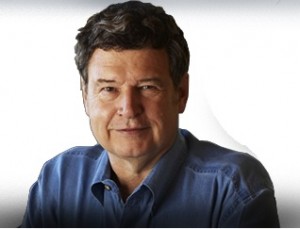 Last night the DharmaSeed KM group listened to a very entertaining talk by Phillip Moffitt about ways to look (mindfully) at making major — or minor — life changes. He talked about different kinds of changes, including developmental changes related to life stages, adjustmental changes made in response to some new circumstance, and insight changes based on a new understanding of life and its meaning.
Last night the DharmaSeed KM group listened to a very entertaining talk by Phillip Moffitt about ways to look (mindfully) at making major — or minor — life changes. He talked about different kinds of changes, including developmental changes related to life stages, adjustmental changes made in response to some new circumstance, and insight changes based on a new understanding of life and its meaning.
He also talked about sex! (You can listen for yourself by clicking here.)
At the end of the talk, he offered metta (well-wishing) to everyone listening. Instead of the traditional phrases, he used ones that he and a group of incarcerated men developed during the years he taught meditation in prison.
I loves these phrases:
May you be safe from internal and external harm.
May you have a calm, clear mind and a peaceful, loving heart.
May you be physically strong, healthy and vital.
May you experience love, joy, wonder and wisdom in this life, just as it is.
May it be so.
Road Trip!
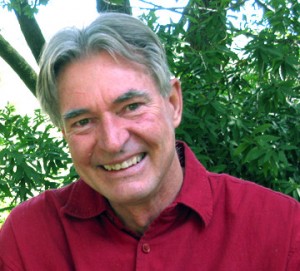 John Travis is leading a 9-day Retreat at Oakwood Retreat Center (near Muncie, Indiana) from October 19-28. It’s short notice (I just found out about this on Friday night), but if you can manage to arrange your schedule and make the trip….do it!
John Travis is leading a 9-day Retreat at Oakwood Retreat Center (near Muncie, Indiana) from October 19-28. It’s short notice (I just found out about this on Friday night), but if you can manage to arrange your schedule and make the trip….do it!
John is terrific. He is one of the teachers at the annual New Year’s Retreat at Spirit Rock, which is where I’ve sat with him. He’s deeply, deeply rooted in both Vipassana and Tibetan practices…has a sweet, gentle style and presence…and an amazing life story that includes living in India, Nepal, Thailand and Burma. You can read more about him here.
I’ve already committed to be at a different retreat, or I’d be going.
Tri-State Dharma is sponsoring this event. There’s no on-line registration, but if you’re interested, send an email to Joan Staubach or Bridget Rolens.
What?!?
 What is it about women that men find so disturbing?
What is it about women that men find so disturbing?
Again, from this month’s DPP homework: ….even the Buddha’s radical move allowing women entrance into the sangha was predicated on their forgetting their sexual difference while following eight rules designed to make sure they never forgot the hierarchy between genders. (For example, the most senior, most accomplished, most perfectly practicing nun must still bow down to –and walk behind — even the youngest, newest, least disciplined monk. Simply because she has had the misfortune to be born into a female form.)
That’s just wrong.
But that’s how it is. To this very day! And not just in “backwards” parts of the world.
So what is it about women that men — and even some women! — find so disturbing/disgusting/dangerous?
OK. Not all men.
But still.
Is it because new life comes from inside our bodies? Because men feel powerless over their own sexual desires and so blame it on the evil, seductive powers of women?
I don’t get it.
(image from “Carnival Mask, Green, Violet, and Pink,” by Max Beckmann)
It’s All Dharma
 The theme for this month’s DPP homework has arrived and it’s a doozie! The topic is: Women in Buddhism, Sexuality and Relationship.
The theme for this month’s DPP homework has arrived and it’s a doozie! The topic is: Women in Buddhism, Sexuality and Relationship.
There are quite a lot of readings, including How American Woman Are Changing Buddhism, by Rita Gross, What’s Wrong with Sex, by David R. Loy, and Buddhism and Intimate Relationships: Monogamy, Polyamory and Beyond, by Jorge Ferrer.
There are also reflections and weekly practices, including: Take a few minutes to image yourself as a female Buddha. What 3 to 5 themes usually left unaddressed by traditional Buddhism would you want to explore? (For example: oppression, new forms of leadership or intensive practice, child-rearing, family life, healthy attachment, etc.)
And….In your meditation this month, spend 10 minutes each week being mindful of your genitals, breasts, etc. as part of mindfulness of the body. Notice how it impacts (or not) your meditation.
Well OK then.
Should be an interesting month.
(image: “Danae” by Artemisia Gentileschi)
Dancing with Awareness
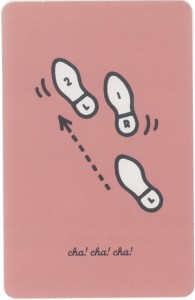 Last night at the Dancing with Life KM group, we spent a lot of time talking about the Third Insight, what Phillip Moffitt calls “knowing that you know.”
Last night at the Dancing with Life KM group, we spent a lot of time talking about the Third Insight, what Phillip Moffitt calls “knowing that you know.”
On page 62, he says, “Using mindfulness in working with the Third Insight means that you practice consciously shifting your awareness….For instance, if you experience pain in your back during sitting meditation, concentrate your attention not on the physical stimulus or even your experience of the pain itself, but rather on your awareness of the pain…..
“In other words, instead of just being aware that the mind is experiencing suffering around an event, notice that the knowing of it is independent from the experience itself.” (emphasis added)
I have learned that this is really the key in being able to connect with whatever’s happening….without reacting to it automatically in some old, habitual way.
On page 63, Phillip goes on to say, “You will quickly notice that this awareness is untouched by what it is aware of, regardless of whether it is pleasant or unpleasant. It is simply there, knowing that it knows. Note, however, that this knowing is not removed from or indifferent to the experience; rather, it offers you an expanded perspective on the experience. It opens you to the awareness of awareness itself.”
This may not sound like much. But in my experience, it’s the difference between being on “auto pilot” and having a conscious choice in the way you live your life.
(image from Q-card by zolo.com)
What Is Already There
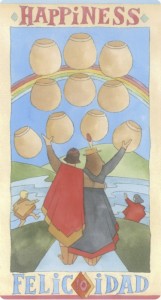 Last night, at the Hi-Pointe Sitting Group, I talked a little bit about what I learned at the retreat….which is how important it is to actually notice and pay attention to whatever contentment is already present, before even starting to try to settle and focus the mind.
Last night, at the Hi-Pointe Sitting Group, I talked a little bit about what I learned at the retreat….which is how important it is to actually notice and pay attention to whatever contentment is already present, before even starting to try to settle and focus the mind.
Then I offered this from “Free and Easy,” by Lama Gendun:
Only our searching for happiness
prevents us from seeing it.
It’s like a vivid rainbow which you pursue without
ever catching,
or a dog chasing its own tail.
Although peace and happiness do not exist
as an actual thing or place,
it is always available
and accompanies you every instant.
Wanting to grasp the ungraspable,
you exhaust yourself in vain.
As soon as you open and relax this tight fist
of grasping,
infinite space is there–open, inviting, and
comfortable.
Make use of this spaciousness, this freedom
and natural ease.
Don’t search any further.
Don’t go into the tangled jungle
looking for the great awakened elephant
who is already resting quietly at home
in front of your own hearth.
(image from Napo Tarot)
Perfect
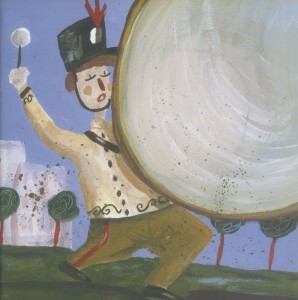 At the Hi-Pointe Sitting Group last night….just as we were starting the meditation…someone, somewhere in the building, started practicing the drums.
At the Hi-Pointe Sitting Group last night….just as we were starting the meditation…someone, somewhere in the building, started practicing the drums.
Such is life.
It would have been even more fitting if I had brought the passage that I had planned to read, which is a teaching from Ajahn Chah, titled: Who is Bothering Whom?:
“In our practice, we think that noises, cars, voices, sights, are distractions that come and bother us when we want to be quiet. But who is bothering whom?
“Actually, we are the ones who go and bother them. The car, the sound, is just following its own nature.
“We bother things through some false idea that they are outside us and cling to the ideal of remaining quiet, undisturbed.
“Learn to see that it is not things that bother us, that we go out to bother them. See the world as a mirror. It is all a reflection of mind.
“When you know this, you can grow in every moment, and every experience reveals truths and brings understanding.”
–from A Still Forest Pool: The Insight Mediation of Achaan Chah, by Jack Kornfield and Paul Breiter
(image from A Whole World, by Couprie and Louchard)
Receiving with Generosity
The latest issue of Spirit Rock News includes an excerpt from Phillip Moffitt‘s terrific new book, Emotional Chaos to Clarity: How to Live More Skillfully, Make Better Decisions, and Find Purpose in Life.
The excerpt is about generosity, which “does not mean self-sacrifice or reckless giving everything away. Such acts,” Phillip writes, “are actually grandiosity disguised as generosity.”
I love that he talks about generosity in such, well….generous terms. He says, “In daily life, generosity means receiving each moment with a generous attitude and meeting it with patience.”
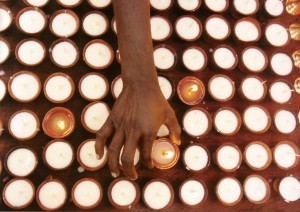 “When interacting with friends or strangers, you give them your full attention as you listen to their words, and you interpret their actions with sympathy, even when they are clumsy.
“When interacting with friends or strangers, you give them your full attention as you listen to their words, and you interpret their actions with sympathy, even when they are clumsy.
“You cultivate magnanimous thoughts that allow you to see others in their best light and to interpret their actions as well-meaning until proven otherwise.
“Being generous in your thoughts doesn’t mean that you’re naive or that you permit a wrong action to go uncorrected. Rather, it means that you treat every one as innately worthy of your respect and care.”
What a beautiful way to live.
(image from “Offerings,” by Danielle and Olivier Follmi)
Note: Dharma Town Times got hit last night with a major spam attack, so I’ve temporarily closed the comments section. You can always send a comment directly to me here.
Engaged
The topic for this month’s DPP homework is Socially Engaged Buddhism. There’s a lot of reading this month, which I expect I will be posting about later on, but one of the reflections and related practice exercises has already captured my attention.
 The question is: How do I work with strong emotions…such as anger, despair, sadness, etc…..that arise about the state of the world?
The question is: How do I work with strong emotions…such as anger, despair, sadness, etc…..that arise about the state of the world?
The practice is: When you notice yourself with a fixed opponent or “enemy”….someone you know or a public figure….investigate how you think, feel, and speak about this person, and notice if you are developing a strongly polarized position in relationship to him/her.
Hmmmm.
(image from Phaidon Portraits)
“Dancing” Tonight
Tonight the Monday night “Dancing” KM Group meets for our on-going discussion of “Dancing with Life,” by Phillip Moffitt. So far, we’ve read to the end of Chapter 6, “The Call to Know That You Know.” As always, we bring a sentence, phrase or paragraph from the current reading to discuss with the group.
I’ve chosen a couple of snippets from various paragraphs on page 61:
 “….beginner’s mind requires you to forsake your desires and ideas about what you will accomplish.”
“….beginner’s mind requires you to forsake your desires and ideas about what you will accomplish.”
“The Buddha cautioned: ‘The future is always other than you imagined it.'”
“Look to those far lofty peaks of enlightenment, heaven, or paradise for inspiration, but live in the now. For in this moment, you are either creating suffering for yourself and others, or you are not.”
(I hope I am not.)
(image from A Whole World, by Couprie and Louchard)
